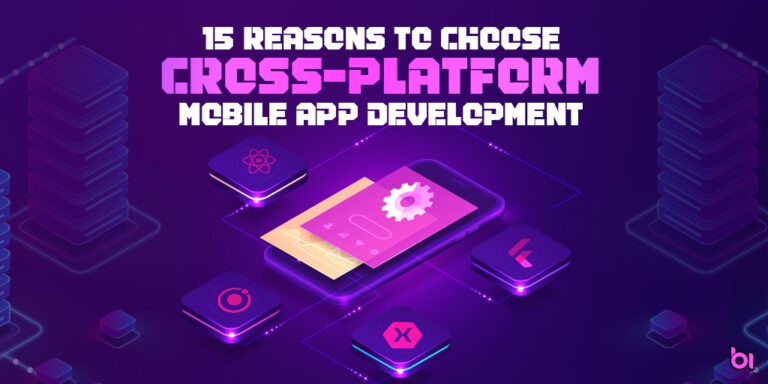Cross-platform mobile app development lets the user use their favorite mobile device applications with any operating system or platform. And, in today’s world, it’s very important to support such applications with a wide range of devices and operating systems.
Cross-platform mobile application development has revolutionized the app development industry, allowing users to install a single app across various operating systems and devices. But why are we doing this, what are the benefits, and how you can benefit from cross-platform mobile app development?
Cross-Platform Mobile App Development 2023 and Beyond
Cross-platform app development refers to the creation of mobile apps that can be deployed and run on multiple mobile operating systems, such as Android and iOS.
In 2023 and beyond, cross-platform app development will continue to be a popular choice for developers and businesses due to its cost-effectiveness and time-saving advantages.
One of the main benefits of cross-platform app development is the ability to reach a wider audience with a single codebase. This means that a single app can be built and deployed on both Android and iOS platforms, rather than having to create separate apps for each platform.
This can save a significant amount of time and resources, as it eliminates the need to maintain separate codebases and go through the separate app submission processes for each platform.
There are several tools and frameworks available for cross-platform app development, such as Flutter, React Native and Xamarin.
These tools allow developers to create high-quality, native-like apps using a single programming language, often with the added benefit of hot reloading, which allows for faster development and iteration.
In the future, we can expect to see even more advancements in cross-platform app development tools and frameworks, as well as increased adoption of these tools by developers and businesses.
With the growing demand for mobile apps across various industries, cross-platform development will continue to be a key player in the mobile app development landscape.
Let’s move on to…
Reasons to Choose Cross-Platform Mobile App Development
1. Support
We have already mentioned that users nowadays have a variety of devices and operating systems with them. They can use their phones, tablets, computers, smart TVs, and smartwatches.
That makes cross-platform application development very important for us as a development company. Users are constantly looking for applications that support their devices and mobile phones.
If you can develop apps that run on multiple platforms like iOS, Android, Windows, and others, you have the edge over your competitors. You can save a lot of money by developing cross-platform apps instead of a separate app for each platform.
2. Development Effort
Cross-platform mobile app development is far more complex than normal mobile development. Every mobile operating system is unique. The apps have to be designed differently to take care of different things like notifications, UI, permissions, and features.
So, when it comes to cross-platform mobile application development, you should be prepared to spend more time. With cross-platform app development, you can only save a lot of time but spend more money.
3. User Experience
When you develop cross-platform mobile apps, the final product will be of better quality than the same app developed for a particular operating system. We will always want a consistent UI with similar features and experience across all platforms.
Cross-platform mobile app development helps you to save time and money and make sure the user experience is excellent. You can easily develop apps with different devices and platforms.
But you will have to be very selective when you do this as there is a big difference between cross-platform and native mobile app development.
Offshore Mobile Apps Development in India
4. More User Feedback
User feedback plays a key role in the success of any app. If you develop native mobile apps, your developers will provide good feedback from their devices. But in the case of cross-platform mobile app development, the feedback is not as effective.
If you develop apps for a particular platform, then your developers have direct knowledge of that platform and the development process will be easy. But for cross-platform mobile apps, you will have to look for experts who are not familiar with the process of each operating system.
5. Flexibility
When you develop cross-platform mobile apps, you will have more flexibility in terms of the development process. You can easily make changes to the app at any time according to your requirement.
But with a native mobile app, you will have to wait until the app is ready for you to make any changes. With cross-platform mobile app development, you will be able to make quick changes to the app and get feedback from your users in real-time.
6. User Acceptance
The user acceptance of a cross-platform app is better than native mobile apps. When you develop mobile apps, you need to ensure that the app is easy to use and is not a hassle for the user. But you can’t always get a good user experience with native mobile app development.
The UI, the look and feel, and the features will not look good on all devices. But, when you develop cross-platform mobile apps, you will get a good user experience, regardless of the device.
Cross-platform apps can run on all devices and platforms, but at the end of the day, you need to provide good user experiences.
7. Cost
Native mobile app development is expensive compared to cross-platform mobile app development. This is because you have to pay for each operating system and each platform to develop the app.
Also, you need a skilled developer who knows each platform inside and out.
8. Time
Cross-platform mobile app development saves a lot of time. But with this process, you need to take the time to ensure that you can maintain a smooth user experience on all the devices and platforms.
There will be some challenges with cross-platform app development, but as you master them, you will find that it’s worth the effort. So, you will be saving a lot of time and money.
How to Reduce App Development Cost: Best Practices, Tools & Pro Tips
9. Customization
If you have a very small business with a single mobile device, then you can design a single app for that device. But if you are having a multi-device business or a business with different users from various regions, then it will be difficult for you to do cross-platform mobile app development.
So, you need to develop a separate app for every device, operating system, and language. You will have to customize the apps differently to make sure that it works the way they should on every device. You will have to spend a lot of time in cross-platform mobile app development.
10. Security
You will get a clear advantage with cross-platform mobile app development when you develop apps for different platforms. With this process, your apps will be more secure, as you will have fewer points of failure and attacks.
There will be different attacks on the apps for every operating system. But with cross-platform app development, the apps will be more secure.
11. SEO
When you develop cross-platform mobile apps, you will get an edge over other apps. You can easily develop a separate mobile app for every platform.
This process will give you the chance to build your app with SEO and mobile app performance in mind. You will get more business for your app.
12. Mobile Device
It has become very difficult to run an app on a mobile device without using some platform. You cannot run apps for your mobile phone on any other operating system. The apps have to be developed on a particular operating system like Android, iOS, Windows, or Blackberry.
But the best part about cross-platform mobile app development is that you can do it all for multiple platforms at once. If you can build apps for Android, iOS, Windows, you will have the best of both worlds in terms of a mobile app.
Top 14 Hybrid Mobile App Development Frameworks 2023
13. User Safety
If you develop a single app, you have the responsibility of making sure that the app is safe. That means that it should not allow the users to access anything illegal or inappropriate on your app.
But if you develop cross-platform apps, you are going to lose this responsibility on your hands. It will be on the shoulders of your users.
So, you need to ask your users about their feedback on each device and platform. This way, you can design the app so that it looks beautiful, is easy to use, and can be safely used.
14. Faster Delivery of Features
What’s interesting about cross-platform mobile app development is that it can cut down on development time. By creating one mobile app, developers don’t have to spend time porting and building the same code for each platform.
With this said, this can lead to developers spending more time testing the same code. It’s also likely that the developer will have to update the code for each platform.
However, cross-platform app development can make this process easier. Instead of having to update one app, developers can just develop and test the app for iOS and Android, then port the code once they have tested it.
Developers can then release new features faster and more reliably because they can be released to users on both platforms at the same time. It can also help reduce the number of bugs when the code is shared between iOS and Android.
15. Greater Market Reach
Developing a single mobile app isn’t always the best option for developers. However, for some developers, it’s a good way to reach a wider audience and maximize their potential for reaching a larger number of users.
For example, a developer who owns an app for one platform, such as Android, might not make money when he or she releases the app on iOS. On the flip side, a developer with a popular iOS app could find that Android users are much more likely to purchase his or her app, especially if they find it while searching the App Store.
Final Thoughts
For the past 20 years, we have known the importance of cross-platform app development and we have seen the evolution from web app development to native app development, and finally the latest evolution in cross-platform mobile app development.
As mentioned before, Cross-platform app development is when the development of a mobile app happens in such a way that makes it possible to have it run on a single mobile device or platform. These apps can also be downloaded for Android or iOS mobile devices.
The reason why it is important to develop a cross-platform mobile app is for the development to provide a single codebase, which is a single version of the code that is required to get it to run on multiple devices.
It does not matter whether you are a company that wants to distribute an application to mobile device platforms, or a company that wants to provide a single app to work on multiple platforms, you can find an app that can be downloaded on an Android device and an iPhone.
If you want to hire a professional app developer, you can choose Cross-Platform Mobile App Development from Binary Informatics, which uses a cross-platform approach, allowing you to create an application that supports multiple operating systems with the same code.




